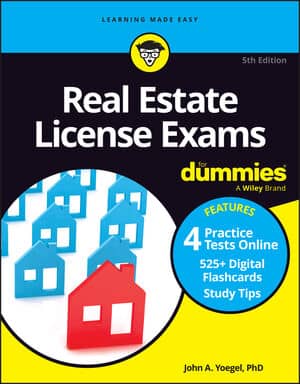The Real Estate License Exam will ask about the basic provisions of the Federal Fair Housing Act of 1968. It defines certain actions that are considered discriminatory and prohibit them. Remember these actions are considered discriminatory with respect to housing and are not permitted. For exam purposes, make sure you understand and remember prohibited activities and can identify them if they’re presented in questions featuring short case studies.
Refusal to sell or rent
This prohibited action is easy to pinpoint. Declarations like, “I won’t rent you an apartment or sell you my house because you are (fill in the blank with a protected class: any race, color, religion, sex, ethnic background, familial status, or handicap).” A specific reason doesn’t have to be mentioned for this kind of refusal to be considered discrimination.
Don’t change terms for rental, sale, or services
A landlord or owner is prohibited from changing the terms or conditions of a rental or sale of a property for different tenants or buyers as a way to discriminate. Here’s an example: You own an apartment building and have extensively researched damages commonly done by various types of individuals and developed a detailed schedule of security payments based on race, family status, and marital status.
Is this activity legal or not? Emphatically, not! Even though you supposedly have objective data and probably claim that you’re not using this activity to discriminate but rather only to protect yourself, it nevertheless is viewed as discrimination.
You can’t tell someone that property isn’t available (when it really is)
If a house has been sold or an apartment already rented, so be it. But tell someone that an apartment is already rented when it isn’t or that a house isn’t available for sale when it is, and that’s considered discrimination and therefore is prohibited.
Don’t scare people into selling: Blockbusting
Blockbusting generally is defined as encouraging people to sell their homes because of the entry or potential entry into the community or neighborhood of a particular group of people. The group usually tends to be different in some aspect, such as race, color, or country of origin. The fear that blockbusting generates is the possible loss of property value.
The idea behind it is to induce panic selling and generate listings of houses to sell or bargains for developers. The prohibition of blockbusting is particularly aimed at members of the real estate industry, because agents benefit from panic selling by getting new listings, but investors who use blockbusting techniques for profit may also be guilty of discrimination.
You can’t tell people where to live: Steering
Steering is guiding, encouraging, or inducing people in some way to move to or stay away from a certain area or neighborhood, and it’s illegal. Overt steering is easy to understand and avoid. Subtle forms of steering in the name of being helpful, like saying, “This is a good neighborhood,” or “You wouldn’t be happy here,” also should be avoided. Self-steering is prohibited also.
For example, if a couple asks to be shown houses “only in White neighborhoods” you can’t accommodate them. You must tell them that you can show them houses that meet their needs and financial situation in various neighborhoods, and then do so.
Although avoiding discrimination is easy when someone says “White neighborhood” or something similar, it’s sometimes a little more difficult to acknowledge the problem when someone asks for a neighborhood where a particular language is heavily spoken, because the family just came to this country. Specifically accommodating a request like this is still considered steering, and it’s illegal.
In some states offering opinions about the quality of the local schools is also considered steering and should be avoided. Though probably not on the exam, real estate agents should provide the same information about a house to every prospective buyer.
Don’t change loan conditions
Once upon a time it was a common practice to not lend money to unmarried women regardless of their income or employment status. It was also common to not count a married woman’s income in the mortgage loan calculation because she’d likely quit work to have children. Nowadays, any such actions, including discrimination on the basis of the other protected classes such as race or ethnic background, are forbidden.
No redlining
Redlining is discrimination in the lending of mortgage money based on location. This happens when a lending institution determines that for various reasons it will no longer make loans in a particular area. It figuratively or literally draws a red line around a particular neighborhood on a map and refuses to make loans on properties in that neighborhood regardless of the personal income qualifications of the borrower.
In 1977, as a result of past redlining activities, the federal government passed the Community Reinvestment Act, which requires certain financial institutions such as banks to develop and implement programs for reinvesting in their neighborhoods through mortgage, home improvement, and other types of loans. These financial institutions come under periodic review to determine whether they’re in compliance.
Denial of membership in real estate organizations
One of the more blatant forms of exclusionary discrimination is denial of membership in a multiple listing association to certain racial or ethnic groups. Because these associations share property listings of houses that are for sale, such a denial has a direct effect on keeping communities segregated.
A more subtle form of this type of illegal activity is a club, group, or association that meets periodically to share property listings where a multiple listing system doesn’t exist. Denial of membership in such a group is a prohibited action. The prohibition extends to any brokers’ organization and includes professional real estate organizations.

